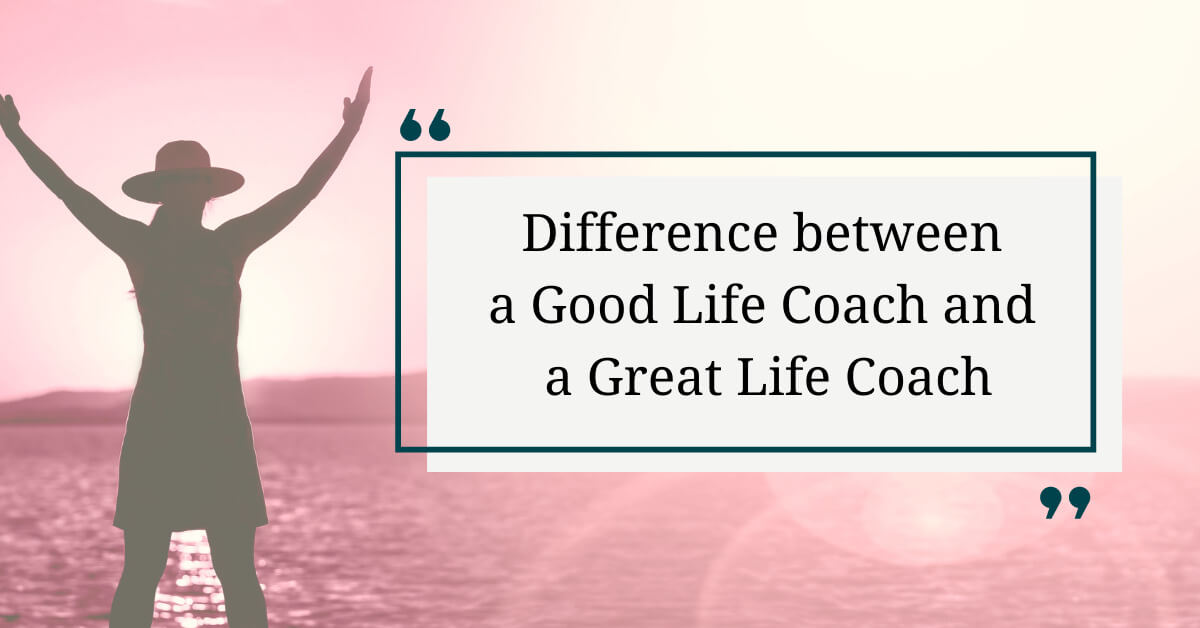So you decided to hire a Life Coach for yourself. You probably google Life Coaches around you and find some Coaches that suit your requirements. And now you have a long list of Life Coaches. Well, how do you pick a “great” Life Coach from good ones?

Choosing the perfect Life Coach for yourself is much like matchmaking, except that you don’t get to match horoscopes before making a decision.
Just like you might come across several potential partners on a matchmaking website. You pick the best one based on certain traits that you want in your partner.
Such is the quest for a great Life Coach too. However, having clarity of what traits you want to look for in a partner (and by corollary, in a Life Coach) makes your job to find the “best” partner easier.
Similarly knowing what traits to look for in a Life Coach can help you find a great Life Coach with the “best” Coaching Program that works for you.
Even though picking a Life Coach for you will involve some subjectivity, there are a few “markers” or “traits” that can help you distinguish a Great Life Coach from a Good one.
Traits that make Life Coaches Great
PS: If you are a Life Coach looking to become better, here are a few suggestions to ponder.
Great Coaches offer “Real Time Strategies” and not just Motivational Talk or Advice

Most Life Coaches rely on motivational talk and giving sound advice to their clients. While there is no problem with either of the two per se, they don’t always work for every client. Why?
External Motivation is only temporary and limits how far it can take you. A Great Life Coach is one who can help you generate your own motivation.
Moreover, they should help you build the discipline to follow through on your commitments when you lack the motivation to drive forward.
Similarly, simply receiving advice from your Life Coach (even if it is the best advice that you need) may not work for you if it is not customized to your needs.
For example, we all hear advice like “exercise for at least 150 minutes a week”. It may be the greatest advice that you can get for your health and well-being, yet it may not work for you if you have been a couch potato all your life.
Instead, if a Life Coach can turn this advice into a “real-time strategy”, such as “start with 10 minutes of exercise that you enjoy, and do it at a time that best fits your schedule” can help break the inertia of a sedentary lifestyle. This can later be scaled up further once the 10 minute-exercise regimen gets integrated into your lifestyle.
A Great Life Coach doesn’t “Spoon-Feed” Solutions

Spoon-Feeding solutions only make us dependent on the Life Coach. For instance, a client may come to a Life Coach with the issue that their romantic interest suddenly started ghosting them.
A Life Coach might suggest, “Send a text to your partner along the lines of ‘hey, just checking up on you since you haven’t replied to my texts or calls. I hope everything’s okay on your end. If not, let me know what is happening. It would be nice to get some clarity on our dating situation’.”
And they also explain the reasoning behind the text. Yet, this suggestion will only make the client dependent on the Life Coach for every problem they encounter. While dependency on Life Coach may be good for the Life Coach’s business, Best Life Coaches will never let profits overshadow their growth.
A Great Life Coach will always guide you into “discovering your own answers”. They would ask pertinent questions that help their clients discover solutions to their own problems.
“I understand that you haven’t heard from your romantic interest in a while. And I understand you think that they might be ghosting you. Can you think of any other reason why your partner may not have returned your calls?”
“There is a possibility that he is really busy somewhere. Still, I expect that my partner should let me know in advance that they are going to be busy for a specific duration, and not leave me waiting anxiously.”
“That does seem reasonable. Have you communicated the same to your partner?”
“No, I was assuming that they are ghosting me because of disinterest. But I think I can text them and ask what’s going on.”
Moreover, a Great Life Coach will help you “apply” your solutions in your life (similar to turning great advice into a real-time strategy). In doing so and by helping us understand how a solution can be integrated into our lives, a Great Life Coach ensures we remain independent and self-reliant.
A Great Life Coach asks “What?”, “When?” and “How?” more than they ask “Why?”

Why questions are helpful in discovering our true intentions of pursuing a particular goal, which in turn can be very uplifting and drive us to achieve our goals.
Yet, when we are dealing with problem behaviours, asking why questions are akin to going down a rabbit-hole
“Why do you think you procrastinate so much?”
“Because I don’t enjoy my work”
“Why don’t you enjoy your work?”
“Because I never wanted to become XYZ”
“Why did you become XYZ if you weren’t interested”
“Because my parents wanted it” and
“Why did you conform to your parents’ choice?”
“Because I have a need for their approval” and so on.
There’s no end to the “Why”.
You either dig infinitely into the past or end up at a reason that puts the blame on someone else (in this case, the parents) and renders you helpless in making a change.
Instead, asking what, when, and how helps you stay anchored to the present and move towards a workable solution.
“What makes you procrastinate?”
“The thought that I don’t like my work”
“What do you want to do about not liking your work?”
“I wish I could switch careers, but I am afraid that it’s a big change for me and I might fail”
“Suppose this fear didn’t exist, what would you like to do?”
“I would transition towards a career in ABC”
“So let’s work towards eliminating your fear first and then we can chart out your transition plan”.
Clear and Actionable!
Great Coaches rely on Objective Assessment of your Progress

Several times Life Coaches rely on how we “feel” and what we “think” about our progress to evaluate our progress. Yet, our thoughts and emotions may not be the most accurate marker of our true progress.
For example, a person may “feel good” about becoming an entrepreneur and may “think” that they are working towards building a startup. Yet, they might have spent the whole week only selecting a name for their startup and making its Facebook page.
A Great Life Coach would ask for specific markers of progress. Before beginning their coaching sessions, they would ask the client for specific indicators that show that they are progressing.
For example, in this case, the client and life coach could have agreed that by week one, the client will select a name for their startup, get it registered, and start working on its website. This will help the Coach as well as the client to know what needs to be done first, how far they have come, and evaluate the challenges faced if any.
This ensures true progress.
Great Life Coaching is a Two-Way Street
The ultimate test of a outstanding personal coach is that they should be able to give you the results that you desire. They must be able to customize their coaching towards your needs and help you overcome the challenges that you face.
At the same time, the results of Life Coaching will depend upon the commitment and the zeal that you show toward doing your part. You won’t become fit just by hiring a nutrition coach and a personal trainer.
You will have to follow the diet plan and the exercise plan. Similarly, you may hire the best Life Coach for yourself, but unless you take action on the strategies laid out for you by your coach, you will not see any progress.
I hope this article helps you find the best Life Coach for you. (And if you are a Life Coach yourself, I hope it can help you become a better Life Coach.) But remember, you do your part too.
Happy Life Coach hunting!
If you are a coach looking at up skilling yourself with advanced coaching competencies you can do that by attending the Cognitive Hypnotic Coaching Diploma.

